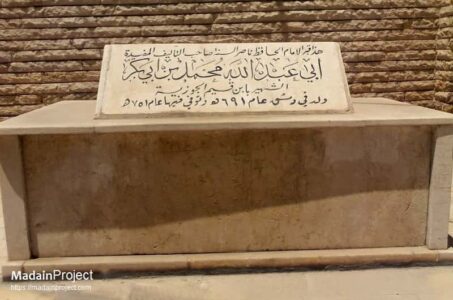Imam Jawji/ Ibn Qayyim-“the scholar of the heart”
Muhammad ibn Abu Bakr (more commonly known as Ibn Qayyim) (1292-1350CE / 691 AH- 751 AH) was a famous Sunni Islamic jurist, commentator on the Qur’an, astronomer, chemist, philosopher, psychologist, scientist and theologian.
Also read- My visit to Abdullah ibn Abbas mosque in Taif
He is famous for his lengthy spiritual commentary on a treatise written by the Hanbali Sufi Khwaja Abdullah Ansari entitled Madarij al-Salikin and for the famous book Zaad al Maad. His contributions to the Islamic library are extensive, and they particularly deal with the Qur’anic commentaries, and understanding and analysis of the prophetic traditions (Fiqh-us Sunnah) (فقه ). (wiki)
This is an independent website by a Female scholar.If you benefit from our articles, Help our Projects by buying our Worksheets (Link1) or (Link2) or removing ads. Bookmark our website so that you can visit it daily for(Digital Tasbih) or (Salah Tracker).
He “wrote about a hundred books” He established a school, Al-Jawziyah (specialized in Islamic studies) It was established in 652 A.H., corresponding to 1254 C.E., in Damascus by Imam Ibn Al-Jawzi.
Read- Dua for studying
Full name of Imam Ibn Al Qayyim
His full name is Abü ‘ Abdilläh, Shams ad-Din, Muhammad ibn Abi Bakr ibn Ayyüb ibn Sa’d ibn Hariz ibn Makki Zayn ad-Din, az-Zurfi then ad-Dimashqi, Al-Hanbali. He is famous as Ibn Qayyim al-Jawziyyah.
His family:
His father was Shaykh Abü Bakr ibn Ayyüb az-Zur’i. He became known as Qayyim al-Jawziyyah because he was the Qayyim of al-Madrasah al-Jawziyyah in Damascus for some time. After him, his children and grandchildren became famous for that, so one of them would be called “ibn Qayyim al-Jawziyyah.” ibn Kathir said, “He is the Shaykh, the worshipper,
Abü Bakr ibn Ayyüb ibn Sa’d az-Zur’i al-Hanbali, the Qayyim of al-Jawziyyah. He was a righteous worshipper, and he was straightforward. He was a noble man, and he heard some of Dalä’il an-Nabuwwah from ar-Rashid al-‘Ämiri. He died suddenly on the night of Sunday, 19th Dhü al-Hijjah at al-Madrasah al- Jawziyyah.
His funeral prayer was performed after Zuhr in the Jämi’ (large Masjid). He was buried at Bäb as-$aghir. His funeral was witnessed by many, and the
people praised him greatly, may Alläh have mercy on him. He is the father of al-‘Allämah Shams ad-Din Muhammad ibn Qayyim al-Jawziyyah, the author of many extremely beneficial works. He was very knowledgeable concerning the regulations of inheritances, and his son Shams ad-Din learned about it from him
His study
One who studies the biography of ibn al-Qayyim, may Allah have mercy on him, will find that he possessed the following qualities: a true desire for seeking knowledge, tremendous patience and persistence in studying issues, independence of thought while learning from his Hanbali teachers as well as those other than them, complete dedication and self-denial for the sake of knowledge. This was completely mixed with his flesh and blood from his earliest days; he began his quest for knowledge from a very early age. In particular, he began seeking knowledge at the age of seven; this becomes clear when we compare his birth date, 691 H, with the dates of the deaths of the teachers from whom he learned.
His Teachers and students
Some of his teachers were-
- Qayyim al-Javaiyyah: His father Abu Bakr ibn Ayyüb. As-Safadi, ibn Taghri Bardi, and ash-Shawkåni mentioned him amongst his teachers. They mentioned that he learned al-Farå’id from him, and he was expert in that field.
- Ibn ‘Abd ad-Dä’im: He is Abü Bakr ibn al-Musnid Zayn ad-Din Ahmad ibn ‘Abd ad-Då’imibn Ni’mah al-Maqdisi, the Musnid of his age. Helived a very long time and died in the year 718 H.
- Shaykh al-Isläm ibn Taymiyyah: Ahmad ibn’ Abdil-Halim ibn ‘Abdis-Salam an-Numayri; hedied in the year 728 H, may Allah have mercy onhim. He learned from him: Tafsfr, Hadith, Fiqh, al-Farå’id, the Two Foundations, ’11m al-Kalüm. He kept close to him until he learned his Fiqh. Hewas one of his brightest students, and he acquired a tremendous deal Of knowledge from him.
- Ash-Shihäb al-‘Åbir: He is Abu al-‘ Abbäs Ahmad ibn ‘Abdir-Rahmån ibn ‘Abdil-Mun’im ibn Ni’ mah an-Nablusi al-Hanbali; he died in the year 697 H.
- Al Mizzi
- Al Hakim
Some of his students were
- Ibn Kathir
- Ibn Rajab
- Adh dahabi
- Al subki
- Al Burhan ibn Qayyim, his son
Many scholars praised him in clear terms, commending his strong stand in support of the Prophet’s Sunnah and in fighting deviation, or bid’at. Indeed, his scholarship continued to inspire students and scholars up to the present day
Ibn Kathir stated that Ibn al-Qayyim,was the most affectionate person. He was never envious of anyone, nor did he hurt anyone. He never disgraced anyone, nor did he hate anyone … I do not know in this world in our time someone who is more dedicated to acts of devotion
His trial
Ibn al-Qayyim was an excellent student and disciple of the great Muslim scholar Imam Taqiyyu-Deen Ahmad Ibn Taimiyyah. He defended his religious opinions and approaches, and he compiled and edited most of his works, and taught the same. Because of some opinions which were not in accordance to majority opinion, both the teacher and the student were unjustly persecuted, tortured, and humiliated in public by the local authorities then.
During his imprisonment in al-Qal’a prison in Damascus, he was constantly reading the Qur’an, and studying its meanings. Ibn Rajab noted that during that period of seclusion, he gained extensive spiritual success, as well as he developed a great analytical wisdom, knowledge, and understanding of the prophetic traditions.
Upon his release, he performed the pilgrimage to Mecca several times, and sometimes he stayed in Mecca for a prolonged period of devotion and circumambulation of the holy Ka’aba.
It was after his release from the prison, he furthered his studies and found his own circle of study which later produced many notable students who became the pioneers of deen.
Discover more from Islam Hashtag
Subscribe to get the latest posts sent to your email.









